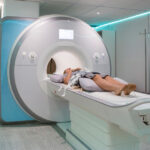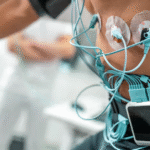The Treadmill Exercise Test (TMX), also known as a cardiac stress test, is a vital tool for assessing how your heart performs during physical activity. It helps us understand if your heart receives adequate blood flow when it’s working hard. This test is particularly useful for individuals experiencing chest pain, shortness of breath, or those with risk factors for coronary artery disease (CAD), such as high blood pressure, high cholesterol, or a family history of heart problems. It’s important because it allows us to detect potential blockages in the coronary arteries, which supply blood to your heart muscle, and assess your overall cardiovascular fitness.
Procedure Overview
During a TMX, you’ll walk on a treadmill while being monitored. Electrodes are placed on your chest to record your heart’s electrical activity (ECG). Your blood pressure and heart rate are also closely monitored throughout the test. The treadmill’s speed and incline gradually increase, simulating the effects of exercise. We aim to increase the workload until you reach a target heart rate or experience symptoms. The test typically lasts between 20-25 minutes of actual exercise, with preparation and recovery time adding to the overall duration. At Heartmatters, we use advanced treadmill equipment and ECG monitoring systems to ensure accurate and reliable results.
Benefits & Importance
The TMX offers several key benefits. It helps detect CAD by identifying blockages that may not be apparent at rest. It provides valuable information about your exercise tolerance and cardiovascular fitness. It helps assess the severity of existing heart conditions and evaluate the effectiveness of treatment plans. By revealing how your heart responds to stress, the TMX helps us determine your risk of future cardiac events and guide appropriate interventions.
Preparation & Requirements
Before the TMX, you’ll be asked to avoid eating or drinking for a few hours. It’s important to wear comfortable clothing and shoes suitable for exercise. You’ll also need to inform us about any medications you’re taking, as some may need to be temporarily discontinued. During the test, you may experience shortness of breath, chest pain, or fatigue, which are normal responses to exercise. After the test, you’ll be monitored until your heart rate and blood pressure return to baseline.
Risks & Considerations
While the TMX is generally safe, there are potential risks, including chest pain, dizziness, and shortness of breath. In rare cases, it can trigger a heart attack or an irregular heartbeat. The test is not recommended for individuals with severe heart conditions, such as unstable angina, severe aortic stenosis, or recent heart attack. It’s crucial to discuss your medical history and any concerns with your doctor to ensure the procedure is appropriate for you.
Understanding how your heart responds to exercise is essential for maintaining good cardiovascular health. The Treadmill Exercise Test provides valuable insights into your heart’s function, allowing for proactive management and lifestyle changes. If you’re experiencing chest pain, shortness of breath, or have risk factors for heart disease, don’t hesitate.














